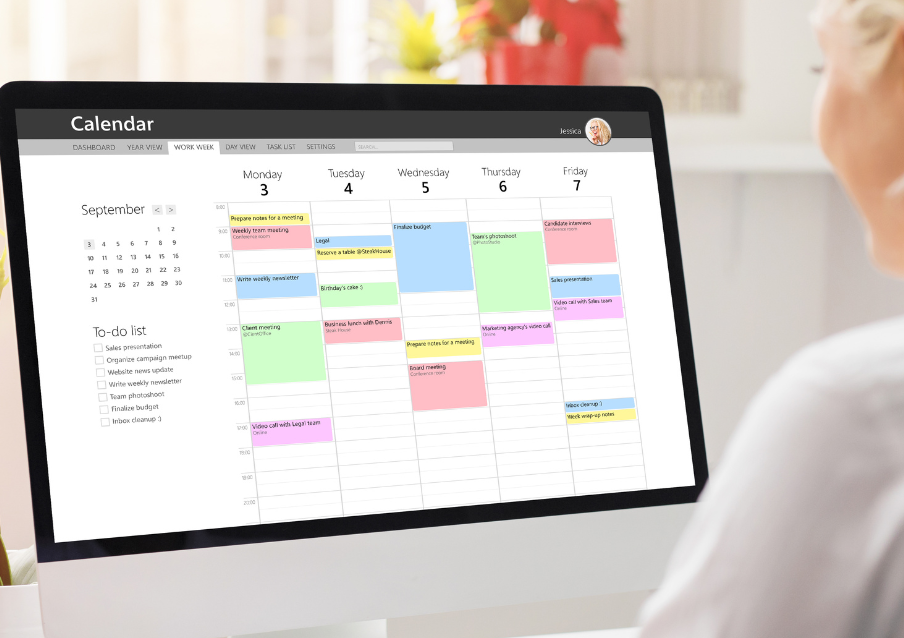Back-to-school season is in full swing, and for college students, it’s a time of new classes, new friends, and a new rhythm of life. Whether you’re a freshman stepping onto campus for the first time or a returning student ready to tackle another year, learning to manage your college schedule is the key to success. This isn’t just about showing up to class; it’s about mastering your time so you can excel academically, stay healthy, and still have fun!
Taking Control of Your Life

For many students, high school came with a built-in schedule managed by parents or guardians. Suddenly, in college, you’re responsible for everything: class times, project deadlines, meals, laundry, social events, and even just getting enough sleep. This newfound freedom can feel overwhelming at first, but taking control of your time and applying strategies to manage your college schedule is the most empowering step you can take toward independence. It’s the difference between feeling like you’re chasing your to-do list and feeling like you’re in the driver’s seat of your own life.
Win more scholarships with less effort
Simplify and focus your application process with the one-stop platform for vetted scholarships.
Check for scholarshipsYour Toolkit for Staying Organized

The first step to learning how to manage your college schedule is finding the right tool. Some people love digital, others prefer analog. Find what works best for you and stick with it.
-
Digital Tools
Use an online calendar like Google Calendar or Outlook. These are great because you can access them from your phone, laptop, and tablet. They also allow you to set reminders and share your schedule with friends or study groups.

-
Apps
A simple reminder app on your phone can be a lifesaver for one-off tasks. Consider project management apps like Notion or Asana for more complex group projects.

-
Analog Tools
If you find that handwriting things helps you remember them, invest in a day planner, a large wall calendar, or a whiteboard. Seeing everything laid out in a physical space can provide a sense of control and clarity.

Manage Your College Schedule with an Organized Calendar
Once you have your tool, the trick is to use it effectively. A messy calendar is just as unhelpful as no calendar at all.

-
Color-Coding
This is a simple but powerful trick. Assign a color to each major category of your life. For example, use blue for classes, green for work, red for project deadlines, and yellow for social events. This lets you see at a glance how your time is balanced.
-
Schedule Everything
Don’t just put in your classes. Schedule your study blocks, exercise time, mealtimes, and even a few hours for downtime. Treating these items with the same importance as a class will ensure they don’t get pushed aside.
-
Time Blocking
Instead of just writing “study,” block out a specific amount of time, like “study for Chemistry from 2-4 PM.” This makes your to-do list a series of manageable appointments.
What to Put on Your Schedule

Your calendar should be a complete picture of your life, not just your academic commitments. A truly effective schedule includes:
-
Academics
All class times, project deadlines, exam dates, and professor office hours.
-
Work
Your shifts or work hours if you have a job.
-
Social & Personal
Club meetings, events, social outings with friends, and planned visits home.
-
Health & Wellness
Time for exercise, meditation, or quiet reflection. Don’t skip these—they are vital for managing stress.
-
Logistics
Appointments for doctors, financial aid counseling, and other important errands.
-
Scholarship Applications
Make sure you add blocks to your calendar enabling you to focus on applying to scholarships every week, year-round! Aim for applying for three scholarships per week to maximizes your opportunities. At any given time, we have at least $500,000 in scholarships that are live on the ScholarshipOwl platform, so it’s always the right time to apply. If you aren’t yet a ScholarshipOwl member, start your free 7-day trial at www.scholarshipowl.com!
Assess Your Calendar’s Balance

Once you’ve filled in your calendar, take a step back and review it. Ask yourself a few simple questions:
- Have you covered all of your most important responsibilities and commitments?
- Is your schedule solely focused on work, or have you included some fun activities to break things up and recharge?
- And perhaps most importantly, have you scheduled in some dedicated downtime just for yourself—moments to relax, decompress, and not “do” anything?
A balanced calendar is one that supports your well-being just as much as it supports your academic and professional goals.
How to Set Boundaries for Yourself
A well-managed schedule requires discipline. Learning to say “no” to yourself and others is a critical skill for success. If a friend asks you to go out during your scheduled study time, you need to be able to say, “I can’t right now, but I’m free later!” Prioritize what’s most important and protect that time fiercely. This is how you ensure that your academic and personal goals are met without burning out.
Reining it in When it Gets Out of Control

We’ve all been there. Your schedule becomes a chaotic mess, and you feel like you’re drowning in commitments. The key is to take a breath and reset.
-
Press Pause
Take one evening to stop everything. Cancel non-essential plans and clear your mind.
-
Conduct a “Time Audit”
Look back at how you’ve been spending your time. Where are the time-wasters? What’s taking up too much energy for too little reward?
-
Prioritize
On a clean calendar, re-enter only the most critical, non-negotiable items first. Then, add back in the next level of priorities until your schedule feels manageable again.
-
Seek Help

Remember, you’re not alone. Your college has a wealth of resources available to you. Reach out to an academic advisor or a counselor at your college’s student counseling center. They can provide tools, strategies, and a listening ear to help you get back on track.
Conclusion

Taking control of your schedule is more than just a college task; it’s a foundational skill for life. By utilizing the right tools, setting boundaries, and knowing how to reset when things get chaotic, you’ll be able to navigate the demands of college with confidence and a sense of calm. Your education is what you make of it, and a well-managed schedule is your roadmap to a successful and fulfilling college experience.



